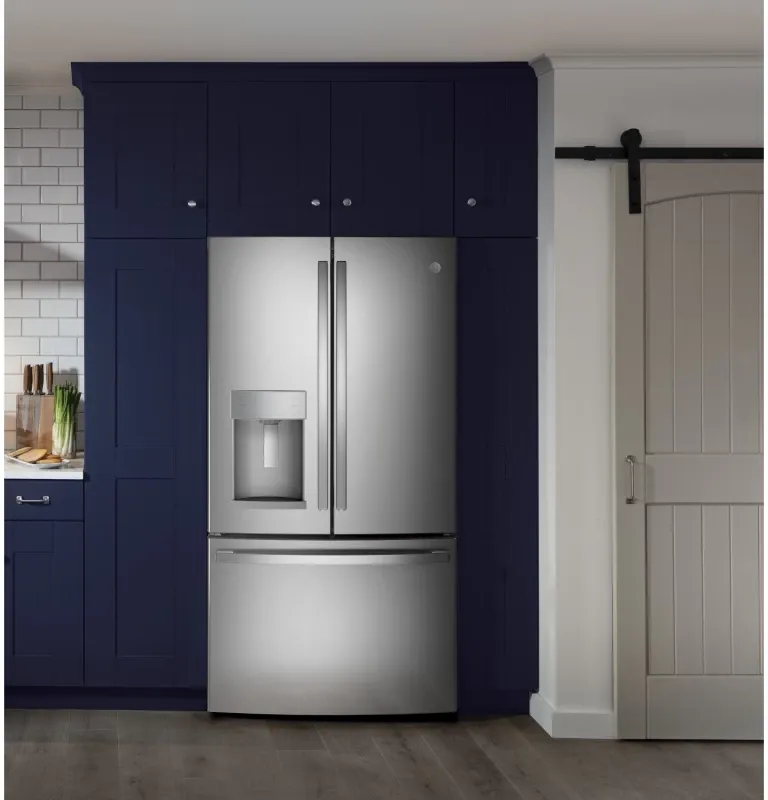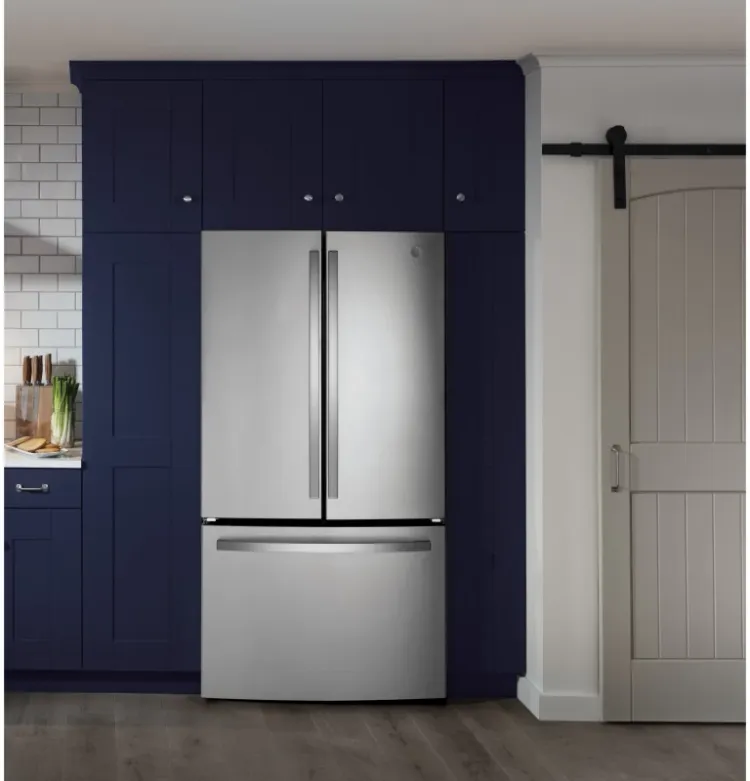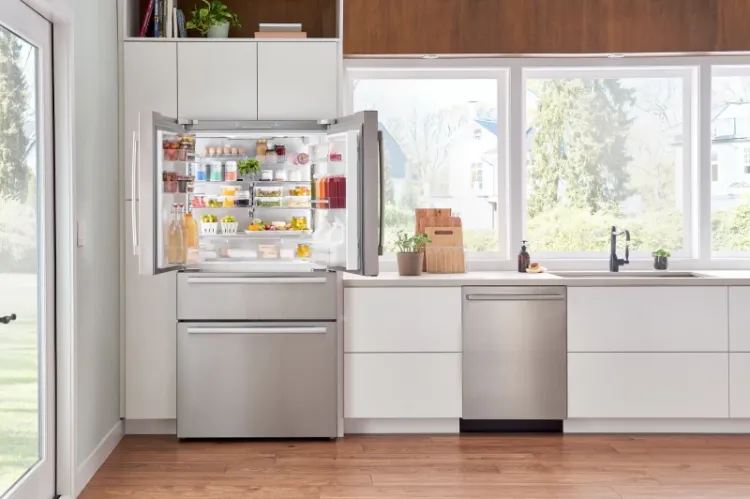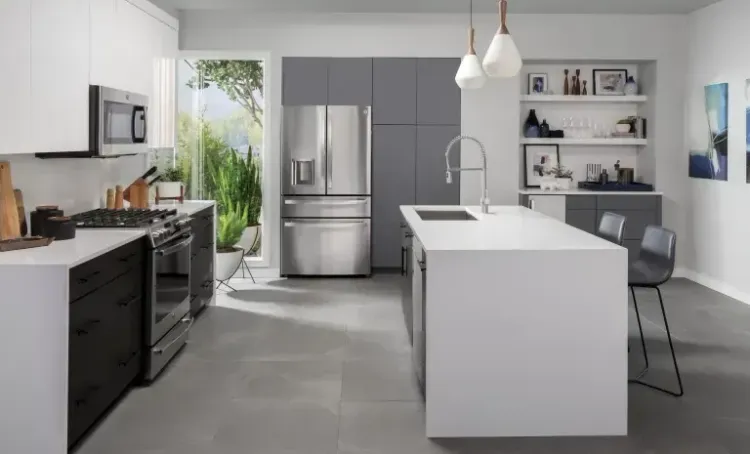What Size Refrigerator Do You Need? A Comprehensive Guide for Homeowners

Ever found yourself playing Tetris with your groceries, trying to squeeze just one more item into an overstuffed fridge? Or perhaps you're tired of hearing the echo in your cavernous refrigerator every time you reach for the milk? If you're nodding along, you're not alone in asking, "What size refrigerator do I need?"
Whether you're renovating your kitchen or simply upgrading your appliances, choosing the right refrigerator size is more than just a matter of measurements – it's about finding the perfect match for your lifestyle. This guide is your roadmap to refrigerator nirvana, where your leftovers, fresh produce, and favorite snacks all live in harmony.
We'll walk you through everything from measuring your space to predicting your future food storage needs. By the end, you'll be equipped with the cool knowledge to choose a fridge that's just right for your home. So, let's open the door to the world of refrigerator sizes and find your ideal kitchen companion!
Why Choosing the Right Refrigerator Size Matters
You might be thinking, "It's just a fridge, right?" Not quite. Selecting the best refrigerator size for your family is more crucial than you might realize. Here's why:
Energy Efficiency
An oversized fridge in a small household is like using a sledgehammer to crack a nut – overkill and wasteful. The right-sized refrigerator helps optimize energy consumption, keeping both your electricity bills and carbon footprint in check.
Food Storage
Too small, and you're making daily grocery runs. Too big, and you're losing track of what's hiding in the back. The perfect size ensures you have just enough space for your weekly haul, reducing food waste and making meal prep a breeze.
Kitchen Harmony
Your refrigerator is the cornerstone of your kitchen's layout. The right size contributes to better flow and space management, making your kitchen feel like a well-oiled machine rather than a obstacle course.
Lifestyle Fit
Whether you're a bulk-buying family of six or a single smoothie enthusiast, your fridge should complement your lifestyle, not complicate it.
By taking the time to find your refrigerator "soulmate," you're setting yourself up for years of kitchen bliss. In the next sections, we'll dive into how to measure for the perfect fit and what factors to consider in your quest for the ideal refrigerator size.
Key Factors to Consider Before You Buy
Before you start browsing refrigerator sizes, let's break down the crucial elements that will guide your decision:
Measure Your Available Space
First things first: grab that measuring tape! Knowing how to measure refrigerator size is essential:
Width: Measure the width of your designated fridge space. Don't forget to account for any adjacent counters or cabinets.
Height: Measure from the floor to the bottom of any overhead cabinets. Remember, you'll need some clearance at the top for ventilation.
Depth: Consider both the depth of your space and how far you want the fridge to protrude. Counter-depth refrigerators offer a sleek look but may sacrifice some capacity.
Pro tip: Measure twice, buy once! A fraction of an inch can make all the difference between a perfect fit and a return headache.
Ventilation Space: Don't Overlook It
Your fridge needs to breathe too! Proper ventilation is crucial for efficiency and longevity:
Allow at least an inch of space on both sides and the back of the refrigerator.
Ensure there's adequate space above for heat dissipation.
Remember, cramming your fridge into a tight spot might save space, but it could cost you in repairs and energy bills down the line.
Household Size and Usage
Now, let's talk capacity. The average refrigerator size you need often correlates with the number of people in your household:
1-2 people: 10-13 cu. ft.
3-4 people: 18-20 cu. ft.
5+ people: 25+ cu. ft.
But wait, there's more to consider! Do you host frequent dinner parties? Are you a meal prep champion? Maybe you're a farmers market enthusiast who stocks up on fresh produce weekly. These lifestyle factors might bump you up to the next size range.
Remember, these are guidelines, not rules. Your ideal fridge size should accommodate your unique household needs and shopping habits. In the next section, we'll explore different refrigerator styles and how they can impact your size decision.
Understanding Refrigerator Styles and Sizes
Now that we've covered the basics, let's dive into the world of refrigerator styles. Each type comes with its own size range and unique benefits:
French Door Refrigerators
French door refrigerators are the supermodels of the fridge world - stylish and spacious. Here's what you need to know:
Size range: Typically 20 to 28 cubic feet
Best for Medium to large families who love to entertain
Features: Wide shelves perfect for party platters, customizable storage options
Pro tip: These fridges offer excellent visibility for fresh foods, reducing the chance of forgotten leftovers turning into science experiments!
Side-by-Side Refrigerators
The side-by-side refrigerator size is ideal for those who like their freezer space as much as their fridge space:
Size range: Usually 20 to 28 cubic feet
Best for Families who use a lot of frozen foods or need easy freezer access
Features: Vertical storage in both fridge and freezer compartments
Consideration: Narrow compartments might limit storage of wide items like pizza boxes
Top-Freezer Refrigerators
The classic top-freezer model is a budget-friendly option that doesn't skimp on functionality:
Size range: Typically 10 to 18 cubic feet
Best for Smaller households or those with limited kitchen space
Features: Simple design, often more energy-efficient
Bonus: Great for shorter individuals who want easy access to fresh foods
Bottom-Freezer Refrigerators
For those who prioritize fresh food access, bottom-freezer refrigerator models offer a smart solution:
Size range: Usually 18 to 22 cubic feet
Best for Households that use the refrigerator compartment more frequently
Features: Eye-level access to fresh foods, often include pull-out freezer drawers
Note: Bending down to access frozen items might not be ideal for everyone
Counter-Depth Refrigerators
Want a built-in look without the custom price tag? Counter-depth models might be your answer:
Size range: Varies, but typically shallower than standard models
Best for Kitchens where space is at a premium or aesthetics are a priority
Features: Sleek, integrated look that doesn't protrude past countertops
Trade-off: You might sacrifice some capacity for that streamlined appearance
Remember, within each style, you'll find variations in refrigerator dimensions. Always refer back to your measurements to ensure the model you love will fit your space!
How to Calculate the Right Capacity for Your Family
Now that we've explored different styles, let's dive into the nitty-gritty of finding the perfect capacity. It's not just about cubic feet – it's about making sure your fridge fits your lifestyle like a glove.
The Golden Rule: As a general guideline, plan for about 4-6 cubic feet of refrigerator space per adult in your household. But remember, this is just a starting point!
Family Size Considerations:
- Single or couple: 10-16 cubic feet
- Family of 3-4: 18-25 cubic feet
- Large family (5+): 26+ cubic feet
But wait, there's more to consider:
Cooking Habits: Are you a gourmet chef who needs space for fresh ingredients, or do you prefer takeout?
Shopping Frequency: Weekly grocery hauls require more space than daily market visits.
Entertaining: If you're the host with the most, you might need extra room for party platters and beverages.
Dietary Preferences: Vegetarians might need more produce space, while meat-eaters might prioritize freezer capacity.
Pro Tip: Use this simple formula to get a ballpark figure:
(Number of people in household) x (5 cubic feet) + (5 cubic feet) = Recommended size
For example, a family of four would calculate: (4 x 5) + 5 = 25 cubic feet
Remember, this calculation gives you a starting point. Adjust up or down based on your specific needs and the other factors we've discussed.
Bonus Consideration - Future-Proofing:
Think about your plans for the next 5-10 years. Are you planning to expand your family? Do you foresee changes in your cooking or shopping habits? It might be worth sizing up slightly to accommodate future needs.
Certainly! Let's move on to the next section:
Special Considerations
As we near the end of our cool journey, let's explore some additional factors that could influence your refrigerator size decision:
Energy Efficiency
Size matters when it comes to energy consumption. Here's what you need to know:
- Larger fridges typically use more energy, but not always proportionally.
- Look for ENERGY STAR certified models, which are about 15% more efficient than non-certified ones.
- A properly sized fridge runs more efficiently than an oversized one that's half-empty.
Pro tip: Don't be tempted to go too big just because it's on sale. The long-term energy costs might outweigh the initial savings.
Technology and Features
Modern refrigerators come with a smorgasbord of features that can affect size and capacity:
- Ice makers and water dispensers are convenient but can take up valuable storage space.
- Smart fridges with screens and cameras might require more depth.
- Specialized compartments (like crisper drawers or temperature-controlled zones) can impact overall capacity.
Consider which features are must-haves and which you can live without. Remember, the fanciest fridge isn't always the best fit for your needs.
Door Clearance and Kitchen Layout
Think beyond just where the fridge will sit:
- Ensure doors can fully open without hitting walls or other appliances.
- Consider the flow of traffic in your kitchen. A large fridge shouldn't become an obstacle course.
- For galley kitchens or tight spaces, a counter-depth model might be your best bet.
Climate Considerations
Your local climate can play a role in fridge performance:
- In hot, humid areas, you might need a more powerful (and potentially larger) fridge to maintain proper temperatures.
- If you live in an area prone to power outages, a larger freezer section could be beneficial for food preservation.
Secondary Refrigeration
Don't forget to factor in any additional cooling appliances:
- Do you have a separate freezer in the garage or basement?
- Are you considering a beverage fridge or wine cooler?
These secondary units might allow you to opt for a smaller main refrigerator.
By considering these special factors, you're ensuring that your new refrigerator isn't just the right size, but also the right fit for your lifestyle and home. In our final section, we'll wrap up with some last-minute tips to help you make your decision with confidence.
Finding Your Perfect Chill Companion
Choosing the best refrigerator size for your family is more than just a numbers game – it's about finding the perfect balance between space, functionality, and your household's needs. Whether you're team French door or loyal to the classic top-freezer, the right fridge is out there waiting for you.
Ready to bring home your new cool companion? Here's where your refrigerator adventure gets even more exciting:
Visit Slyman Bros Appliances in St. Louis to explore a wide range of refrigerator options in person. Our knowledgeable staff can help you navigate refrigerator dimensions, styles, and features to ensure you find the ideal fit for your kitchen and lifestyle. With your newfound knowledge and our expert guidance, you'll be well-equipped to make a decision that will keep your food fresh and your kitchen running smoothly for years to come.
Remember, the perfect refrigerator isn't just about storing food – it's about enhancing your daily life and making your kitchen the heart of your home.



